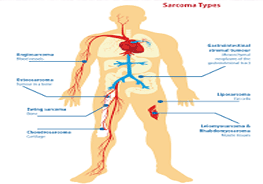What Is Soft Tissue Sarcoma?
Soft tissue sarcoma is a type of cancer that develops in the soft tissues like muscles, nerves, fat, blood vessels etc.
Soft tissue tumours most commonly develop in children's arms, legs, chest, neck and abdomen. Soft tissue cancer can spread (metastasize) to other parts of the body if left untreated.
Causes of childhood soft tissue sarcoma?
Soft tissue sarcomas are caused by unknown factors. Some of the risk factors for your child include:
- Inherited genetic disorders like Neurofibromatosis and Li-Fraumeni syndrome
- Certain chromosome abnormalities cause prenatal genetic changes.
- Treatment with radiation therapy in the past
- Chemical exposure, such as exposure to vinyl chloride
- Infections with AIDS and Epstein-Barr virus (EBV)

The different types of soft tissue sarcomas
Soft tissue sarcomas come in a variety of forms. Only few types of soft tissue sarcomas are common in children, rest are more common in adults. The common types which we see in children are:
- Rhabdomyosarcoma (the most common sarcoma in children)
- Fibrosarcoma
- Synovial sarcoma
Other adult type sarcomaswhich are not common in children are:
- Leiomyosarcoma, affects the stomach, uterus and bladder.
- Malignant peripheral nerve sheath tumour in the nerve's protective covering
- Desmoplastic small round cell tumor (DSRT)
- Inflammatory myofibroblastictumor
- Hemangiopericytoma
- Lipo sarcoma (fat cell cancer) –rare in children
The signs and symptoms of childhood soft tissue sarcoma
In the early stages, soft tissue tumours may not cause any symptoms. A painless lump or swelling under the skin is the most common symptom. Sarcomas can press on nearby muscles, nerves, organs, and blood vessels as they grow in size, causing:
- Numbness, tingling, or pain
- Weakness
- Having difficulty breathing
- Because these symptoms are common in other childhood diseases, they may or may not be indicative of soft tissue sarcoma. To determine the cause of these symptoms, your paediatrician will need to thoroughly examine your child.
How is soft tissue sarcoma diagnosed in children?
- Imaging studies like CT, MRI, ultrasound are used to detect soft tissue tumours.
- A biopsy from the suspected mass or swelling will confirm the diagnosis. Biopsy is a tissue sample of the tumour that a pathologist can examine in a lab to determine whether the growth is cancerous or not.
- PET CT scan is done to look for the spread of the disease once diagnosis is confirmed by biopsy.
How is soft tissue sarcoma treated in children?
There are several treatment options available for children with soft tissue sarcomas, including:
- Cancer surgery to remove the entire tumour and surrounding tissue, if necessary Radiation therapy, including:
- External beam using a machine to focus high-powered X-rays on the tumour Brachytherapy (internal radiation) uses tiny implants to deliver radiation directly into or near the tumour.
- Chemotherapy using drugs administered orally or intravenously
- Targeted therapy employs drugs that target cancer cells while leaving healthy cells alone.
- Children with soft tissue sarcomas often respond better to treatment than adults and have a better prognosis.
For enquiries, bookings or support, call us at +91-96508 06846
Need help? Get a call back from our support team
Contact Us

